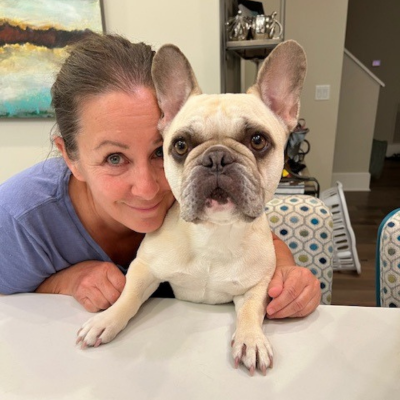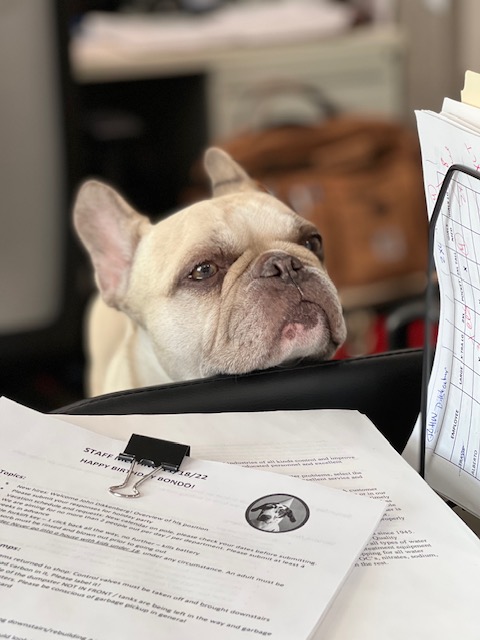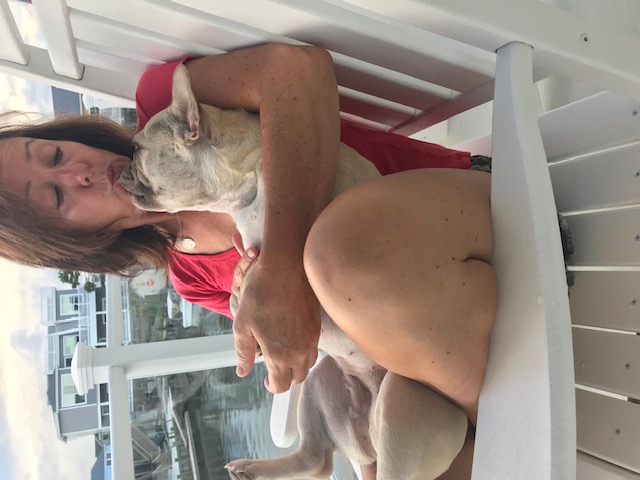Out of nowhere
A surprise brain cancer diagnosis left Violet the French bulldog’s family reeling. A clinical trial testing a new tumor treatment seeks to bring patients like her more quality months with their families.

A surprise brain cancer diagnosis left Violet the French bulldog’s family reeling. A clinical trial testing a new tumor treatment seeks to bring patients like her more quality months with their families.
Violet snuggles in a blanket at her home.
The miles were long, but every minute Ruby and Rob Kinney had a chance to spend with their 6-year-old French bulldog Violet was a gift.
Every three weeks for four months during Summer 2023, they traveled nearly 1,200 miles with Violet from New Jersey to the University of Minnesota College of Veterinary Medicine (CVM), where she was enrolled in a clinical trial for dogs diagnosed with glioma—the second most common type of brain tumor in dogs and the hardest to treat. It’s typically fatal within months of diagnosis.
The trips came with stress and exhaustion, but there was a small chance Violet could experience several more months of quality life and a bigger chance that her participation in the trial could help other dogs—and eventually people.

“We could have stuck around home and done radiation, but I had a friend die of the same thing in February of 2023, and it was kind of ironic that now my dog had the same tumor,” Ruby Kinney says. “But I had hope. We were scared and upset but hopeful. I knew it wasn't going to be easy, but I didn't realize how hard it would be.”
Before her diagnosis, Violet would spend her days accompanying Ruby to work at her and Rob’s water treatment business. The little bulldog was a bit on the shy side, so Ruby thought it was a nice opportunity for her to socialize. It was a good fit for sweet and calm Violet.
Then the family’s world turned upside down in April 2023 when Violet suddenly seized while the Kinneys were on a trip.
“At first, I thought she was choking. I wasn't quite sure what was happening,” Kinney recalls. “There were no other signs. There was nothing—just this major seizure. We brought her to the emergency room, and they said either she has epilepsy or she has something going on in her brain.”
After further testing, Violet was diagnosed with a glioma in June and the Kinneys set out to determine if more could be done for her. An internet search brought them to the Canine Brain Tumor Clinical Trial Program facilitated through the Veterinary Clinical Investigation Center at CVM.
The program is a pioneer in developing and testing new treatment options that preserve patients' quality of life and improve long-term survival rates. In Ruby’s case, there was a chance she could live another eight to 12 months if she enrolled in the trial, which focused specifically on French bulldogs diagnosed with gliomas.
“French bulldogs do develop gliomas in much higher frequency than the general patient population, and we have limited treatment options for them,” says Dr. Susan Arnold, a veterinary neurologist and an investigator on the trial, which is led by Dr. Liz Pluhar, director of the Canine Brain Tumor Clinical Trial Program. "We do not know exactly why French bulldogs have this problem, but we are actively working to try to figure it out.”
Upon weighing the risks and benefits, the Kinneys opted to enroll Violet. She then underwent surgery to remove a majority of her tumor. After surgery, Violet began sonodynamic therapy to treat any remaining cancer cells. This type of therapy first involves administering a medication that is absorbed by tumor cells.
“Taking up this medication makes tumor cells die as a result of contact with ultrasound waves, which can penetrate the skull to reach brain tumor tissue,” Arnold says. “Violet had most of her tumor removed surgically, then had repeated rounds of sonodynamic therapy to address whatever tumor cells remained.”

During those months of treatment and recovery, Violet experienced mobility issues and needed help getting around, particularly with stairs. She spent a lot of time lying on Ruby’s lap but did become less skittish around other people.
“She was kind of doing her thing, and we'd have a lot of days where you kind of forgot that she had had a terminal illness,” Ruby says.
An MRI scan in September brought unfortunate news. Violet was experiencing regrowth in the area where her original tumor was removed. She also had hydrocephalus, a condition in which cerebrospinal fluid abnormally builds up within cavities of the brain. Arnold placed a shunt in Violet’s brain to drain the excess fluid.
At this point, the Kinneys chose to withdraw Violet from the trial and let her live out her last few months in their home. She passed away in January 2024.
Violet’s legacy lives on in the knowledge gained from her case and from other trial participants who are helping researchers develop these cancer treatments for dogs and pave the way for their use in humans as well.
“We know that pet dogs develop gliomas that behave very similarly to the worst form of brain cancer that people get, called glioblastoma multiforme. In both dogs and people, the prognosis is poor,” Arnold says. “There is a critical need to develop a treatment that improves patient outcomes. That's the key rationale for these trials: What can we do to improve the quantity and quality of life for people and pets afflicted with this terrible form of cancer?”

Each year, an estimated 90,000 people are diagnosed with a brain tumor, according to the American Brain Tumor Association, making it the fifth most common type of cancer. Violet’s contribution to research seeking to find effective treatments in both animals and people is something Ruby Kinney takes comfort in and was part of the motivation for enrolling her in the trial.
“Maybe it will help people down the road with some kind of cure or something to help maintain their quality of life so they don't pass away as quickly,” she says.
Violet’s enrollment in the trial and her brain surgery also gave Ruby a very niche expertise and she has become a resource for other pet owners whose dogs have undergone brain surgery.
“I am grateful that Ruby and Rob were so committed to helping others, and they really did make a positive impact through their kindness,” Arnold says.
Violet is very much missed by her family, but she lives on in their memories and in medical data that could one day turn the tide in the fight against cancer—for both pets and people.
For more information on the Canine Brain Tumor Clinical Trial Program and other studies at the Veterinary Clinical Investigation Center, contact the center at vcic@umn.edu or visit its website.
If you'd like to support clinical trials through a gift, you can donate to the Clinical Investigation Research Support (CIC) Fund by clicking here.